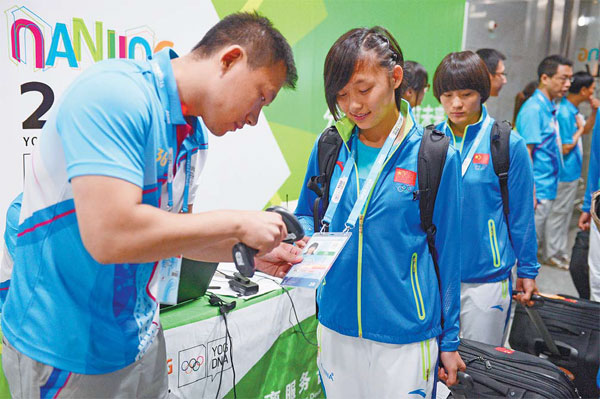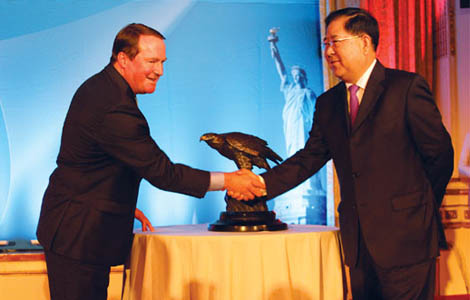Athletes get schooled on drugs
Updated: 2014-08-14 07:07
By Sun Xiaochen in Nanjing (China Daily)
|
||||||||
Education about perils of doping 'as important as' testing at Games
The anti-doping campaign at the Nanjing Youth Olympic Games will focus more on educating young athletes about drug prevention rather than intimidating them through intensive tests, Games officials said.
To instill fair-play principles from an early age, the anti-doping activities at the second summer Youth Olympic Games in Nanjing will involve teaching the dangers of drugs and promoting honesty, said Zhao Jian, executive deputy director of the anti-doping team for the Nanjing organizing committee.
|
A staffer scans the identification cards of Chinese athletes arriving in Nanjing for the second summer Youth Olympic Games on Wednesday. Wei Xiaohao / China Daily |
"Education will play a major role as important as testing in the anti-doping program in Nanjing," Zhao said.
"These athletes are just starting their careers in sports and they need to understand that doping is not the answer. Of course, if anyone tests positive, action will be taken," he said.
Tests during the Youth Olympic Games will be conducted only at a doping control station in the Youth Olympic Village. At the Olympic Games, tests are taken at each venue.
Athletes will be notified in advance once they are chosen to take a test, and a coach will be allowed to accompany them for the testing since the athletes are under the age of 18.
Athletes and coaches will also be invited to the village's anti-doping booth where World Anti-Doping Agency experts will offer educational, interactive seminars on drug prevention.
WADA is also presenting its Play True Generation program, first launched during the inaugural Youth Olympic Games in Singapore in 2010, for teenage athletes to learn about their rights and responsibilities in the fight against doping.
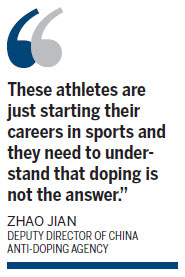
"It is not just deterrence, though that is important. ... Prevention is crucial to the long-term success of anti-doping programs, and WADA does a huge amount in that regard," said Kirsty Coventry, Olympic champion swimmer from Zimbabwe and WADA Athlete Committee member.
Coventry will join other Olympians and WADA experts to promote the anti-doping education in Nanjing.
"Values-based education programs are now used by sports federations and anti-doping organizations. These tools are now central to every anti-doping program, and serve as a reminder for athletes to understand why doping is the wrong choice to take against the spirit of sport," she said.
From Aug 12 to 28, approximately 300 urine tests will be conducted, according to International Olympic Committee and WADA rules. Blood tests may also be required if necessary, Zhao said.
All samples collected in Nanjing will be sent to a WADA-accredited laboratory in Beijing and analyzed by 30 lab technicians working under the China Anti-Doping Agency specifically for the Games.
The Nanjing organizing committee has trained 50 doping control officers to carry out testing procedures.
"China Anti-Doping Agency conducts regular training annually and all the staff are people with medical backgrounds, such as nurses and doctors. Student volunteers will not be involved in anti-doping operations," said Zhao, who is also the deputy director of the agency.
Xinhua contributed to this story.
sunxiaochen@chinadaily.com.cn
(China Daily 08/14/2014 page7)
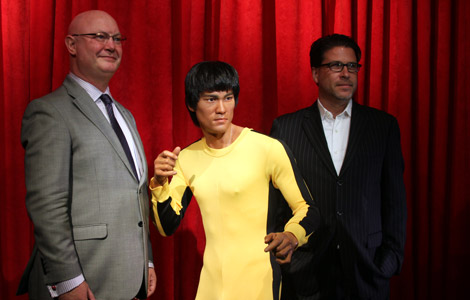
 Enter the dragon - the wax dragon
Enter the dragon - the wax dragon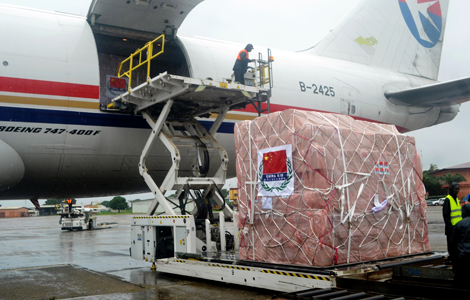
 Ebola collaboration urged
Ebola collaboration urged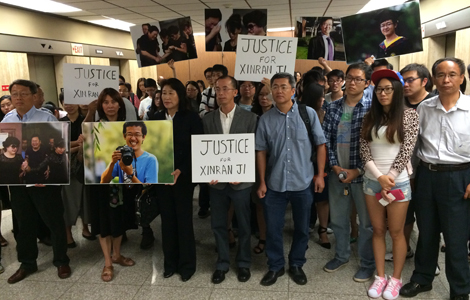
 Chinese rally at court for Ji
Chinese rally at court for Ji
 China's Napa Valley bid ripe for growth
China's Napa Valley bid ripe for growth
 Wanda's Hollywood premiere gets welcome
Wanda's Hollywood premiere gets welcome
 Sheriff official: Robin Williams killed himself
Sheriff official: Robin Williams killed himself
 Chinese warships visit US navy base after joint drill
Chinese warships visit US navy base after joint drill
 Unique panda triplets take a bow
Unique panda triplets take a bow
Most Viewed
Editor's Picks

|

|

|

|

|

|
Today's Top News
Brazil presidential candidate Campos killed in plane crash
US Marine deployment raises brows
China, global markets spur Priceline deal
More than 1,000 auto firms probed
Chinese fans mourn beloved star
Deng TV series lifts the lid on key years
Futures consultants see future in China
Menlo Park VC invests in China's medical tourism
US Weekly

|

|
